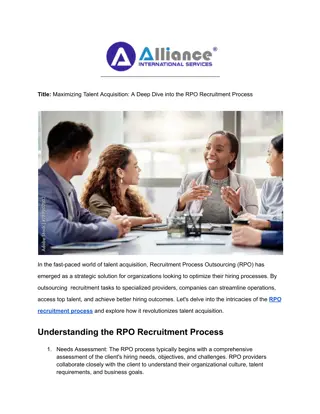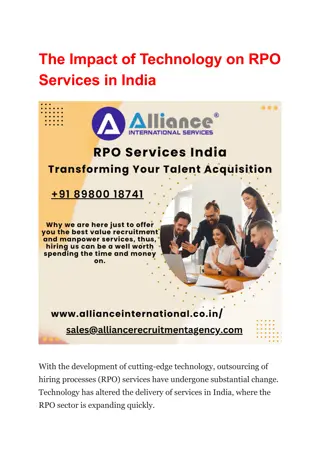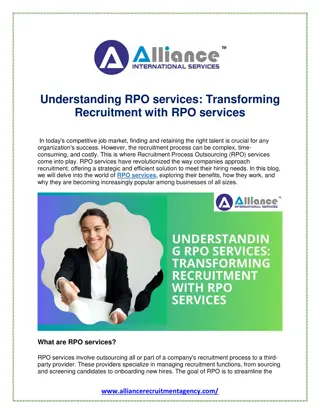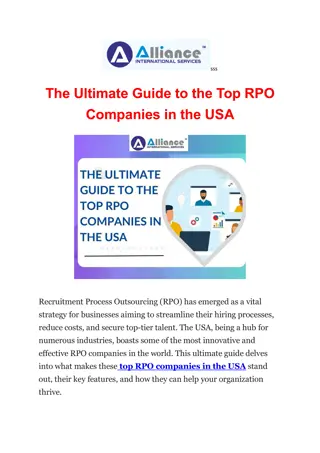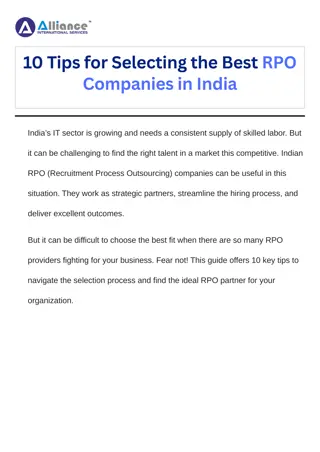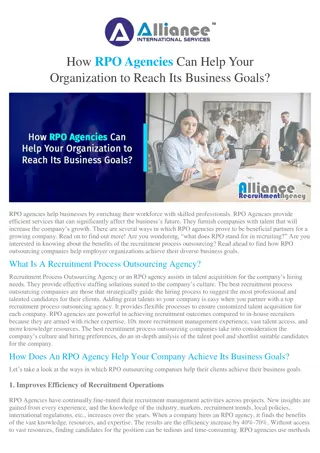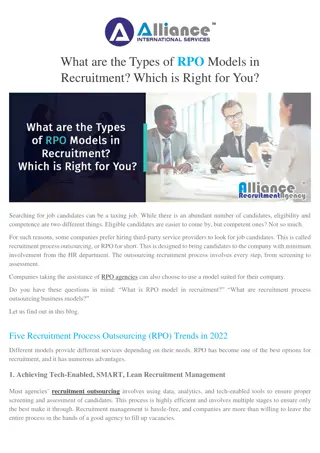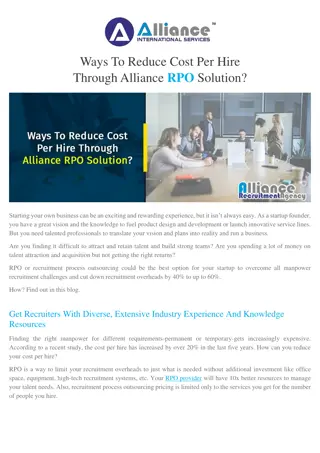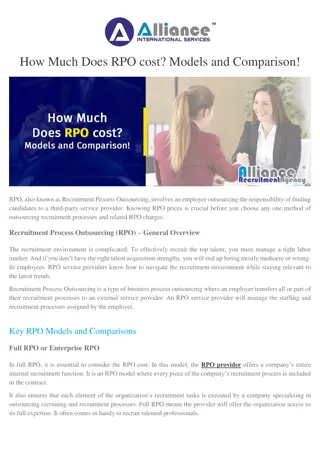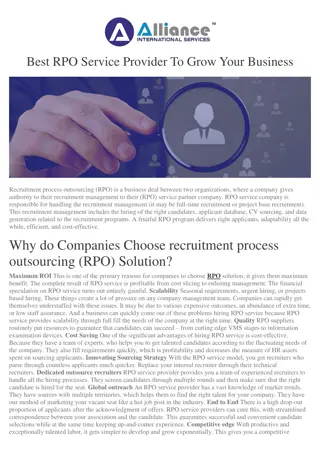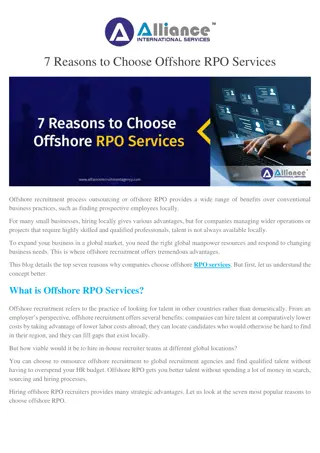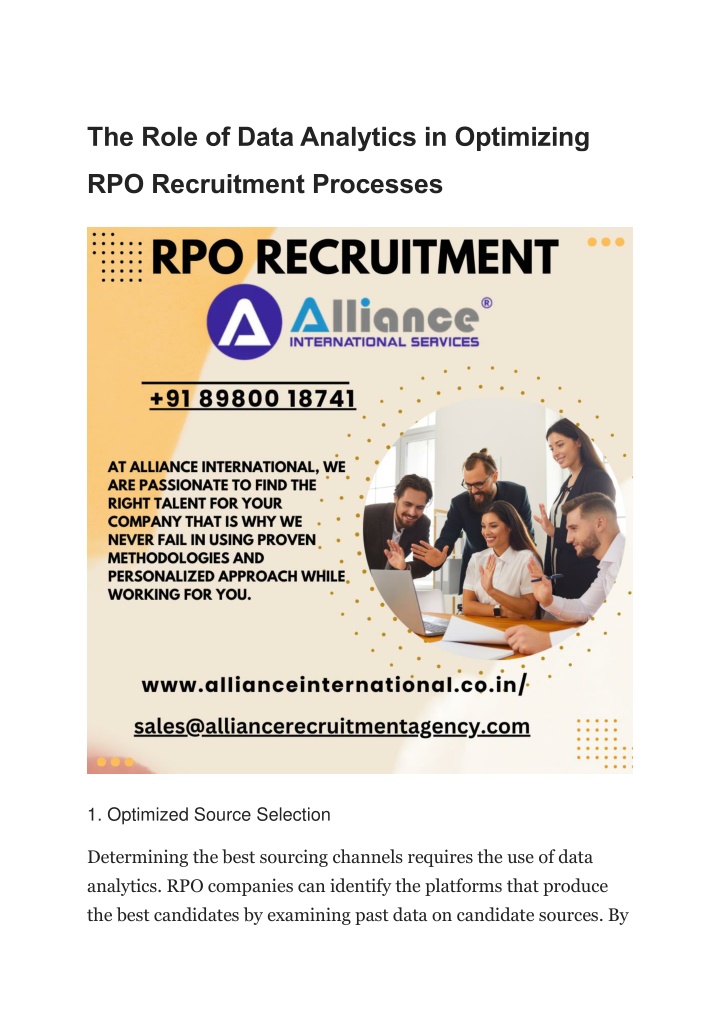
The Role of Data Analytics in Optimizing RPO Recruitment Processes
Determining the best sourcing channels requires the use of data analytics. RPO companies can identify the platforms that produce the best candidates by examining past data on candidate sources.
Download Presentation

Please find below an Image/Link to download the presentation.
The content on the website is provided AS IS for your information and personal use only. It may not be sold, licensed, or shared on other websites without obtaining consent from the author. If you encounter any issues during the download, it is possible that the publisher has removed the file from their server.
You are allowed to download the files provided on this website for personal or commercial use, subject to the condition that they are used lawfully. All files are the property of their respective owners.
The content on the website is provided AS IS for your information and personal use only. It may not be sold, licensed, or shared on other websites without obtaining consent from the author.
E N D
Presentation Transcript
The Role of Data Analytics in Optimizing RPO Recruitment Processes 1. Optimized Source Selection Determining the best sourcing channels requires the use of data analytics. RPO companies can identify the platforms that produce the best candidates by examining past data on candidate sources. By
concentrating on channels that offer the highest return on investment (ROI), they are able to deploy resources more effectively thanks to this knowledge. 2. Enhanced Screening of Candidates Sophisticated data analytics technologies can make the screening process for candidates more efficient. These programmes analyse application data and resumes to find relevant experiences and qualifications that match job requirements. Recruiters can make better decisions and spend less time manually evaluating candidates by using machine learning algorithms that predict candidate success based on trends identified in historical recruiting data. 3. Utilising Predictive Analytics in Workforce Management RPO recruitment provider can foresee future employment needs by using predictive analytics, which analyses trends and patterns in past data. Through the examination of variables including company expansion, employee attrition, and market dynamics, RPO suppliers are able to forecast hiring needs and proactively construct talent pools. This proactive strategy guarantees a consistent flow of competent applicants and helps businesses avoid talent shortages. 4. KPIs and Performance Metrics During the hiring process, outsourcing companies can monitor and assess key performance indicators (KPIs) thanks to data analytics. Metrics like applicant excellence, cost-per-hire, and time-to-fill offer valuable information on the efficacy and efficacy of hiring tactics. RPO providers may pinpoint areas for development and implement
data-driven modifications to their procedures by consistently tracking these KPIs. 5. Improved Prospective Experience RPO providers can have a deeper understanding of the application process by analysing data and feedback gathered from applicant interactions. Through the identification of pain points and areas of dissatisfaction, modifications can be made to enhance the recruitment process in its entirety. Data analytics, for instance, might highlight bottlenecks in filing applications or interaction, enabling RPO providers to improve applicant experience by streamlining these areas. 6. Inclusion and Diversity Data analytics can be used to track and enhance initiatives for inclusion and diversity in hiring procedures. RPO providers can spot biases and discrepancies in hiring and candidate selection procedures by examining demographic data. With the use of this data, they may put measures into place that encourage a more inclusive and varied workforce, guaranteeing fair and equitable recruiting procedures. 7. Management of Talent Pools Managing talent pools well is crucial to hiring procedures being optimised. In order to give RPO providers access to the most current and pertinent information, data analytics assists in the upkeep and updating of candidate databases. Proactive recruitment efforts can be facilitated by RPO providers ability to identify passive prospects
who might be interested in future possibilities through the analysis of candidate interaction and activity data. 8. Comparative Evaluation RPO companies can compare their efficiency versus rivals and industry norms thanks to statistical analysis of data. RPO providers can determine their strengths and areas for growth by comparing data like candidate quality, cost-per-hire, and the time it takes to. They are able to keep a step ahead of market trends and gain an edge thanks to this competitive intelligence. 9. Making Strategic Decisions In RPO hiring, insight based on data facilitate making intelligent choices. RPO companies can use analytics to find patterns and developments that guide strategic decisions like entering new markets, modifying hiring practices, or making investments in cutting-edge technology. Decisions are made on the basis of reliable proof rather than conjecture or gut feeling thanks to this informed by data method. Obstacles and Things to Think About Even while data analytics has several advantages for streamlining RPO hiring procedures, there are some drawbacks to take into account: Data Quality: Reliable analytics depend on the correctness and completeness of the data. Inadequate data quality can result in erroneous inferences and less than ideal choices.
Data Integration: Reconciling disparate data sources can be challenging and necessitates reliable data management tools. Privacy and Security: RPO suppliers need to follow data privacy laws and have robust security measures in place to protect candidate data, which is very important. Competent Staff: Making the most of data analytics calls for knowledgeable individuals who can successfully comprehend and act upon data insights. Alliance International is one such brand name that excels in providing RPO recruitment services in India Conclusion One effective technique for streamlining RPO hiring procedures is using data analytics. Analysis of data boosts recruiting productivity and efficacy by optimising applicant search, screening, and forecasting workforce planning, as well as by offering useful metrics for success. It also facilitates making tactical choices, improves the applicant expertise, and promotes diversity and inclusion initiatives. To fully realise the potential of data analytics in RPO recruitment, however, issues with data integrity, unity, privacy, and expertise must be resolved. Contact us today to learn more about how we can support your business goals.







